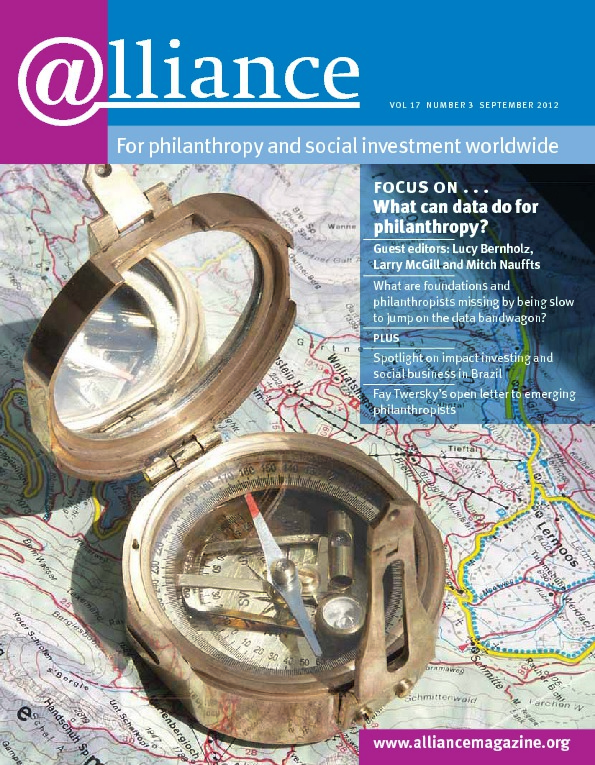Brazilians are serious about their fruit. From abacaxi (pineapple) to maracujá (passion fruit), the seemingly endless array of fruits here can be both inspiring and overwhelming. But look in any supermarket and you will see the discerning Brazilian shopper squeezing and smelling each fruit. They know that when they pull back the peel of a perfectly polished, waxed and artificially coloured fruit they’ll likely find an unripe centre.
 At first glance, the dynamic social enterprise (or more commonly used social business or negocios sociais) sector in Brazil appears mature and ripe for the picking. The Aspen Network of Development Entrepreneurs (ANDE) Brazil chapter is the most active outside North America. There is a tremendous amount of innovation, and the idea of entrepreneurship as a means of achieving social good is increasingly popular.
At first glance, the dynamic social enterprise (or more commonly used social business or negocios sociais) sector in Brazil appears mature and ripe for the picking. The Aspen Network of Development Entrepreneurs (ANDE) Brazil chapter is the most active outside North America. There is a tremendous amount of innovation, and the idea of entrepreneurship as a means of achieving social good is increasingly popular.
A recent report conducted by Plano CDE on the ‘social and inclusive business’ sector across Brazil collected data from 140 social/inclusive businesses, 60 incubators, 24 accelerators and 15 investors (while few were exclusively focused on supporting social enterprise, many were active in doing so even if not self-identifying as such). The report unearthed a variety of different types of social business. Most were service-oriented enterprises; education, financial services (microcredit) and culture were the most common sectors of operation, with an emphasis on improving incomes and livelihoods. Most are relatively new, having started within the last decade, and heavily concentrated in the urban south-east. The report concludes that, despite the gaps in meeting the needs of communities at the base of the pyramid, social business can tap into significant market opportunities in education, healthcare, housing and technology in Brazil.
Sowing the seeds
Several social business incubators and accelerators have emerged. Operating in Brazil since 2007, NESsT has supported the development of nearly 50 social enterprises, providing mentoring on feasibility study and business plan development, incubating a portfolio of enterprises over 3-5 years with multiple rounds of financial and business development support, and deploying a network of nearly 50 Brazilian business volunteers to provide additional advice and coaching. ‘We’re starting to see a more mature generation of social enterprises in Brazil that are ready for expansion and scaling,’ says NESsT Brasil portfolio associate Danielle Comar. ‘But very few people are willing to invest in the early stage to build this pipeline. That needs to change if the sector is going to grow.’ Comar points to INCORES, which is now moving into NESsT’s scaling portfolio to expand its enterprise providing job training and placement services for underprivileged youth in Salvador, Bahia.
Mariana Paál Fernandes of Artemisia confirms this. ‘The social enterprises sector in Brazil is booming,’ she says, but ‘one of the main challenges we face as a sector is to find and accelerate high-potential start-ups to become good social business cases and connect them to the available capital, so they can achieve scale.’ Founded in 2003, Artemisia’s Aceleradora de Impacto or Impact Accelerator supports selected social businesses through an intensive six-month programme, refining the business model, training the management team and connecting them with national and international investors.
A number of other social business evangelists are also emerging. CDI has launched a social business portal (www.negociossociais.com) to promote social business in Brazil. Rio-based Cria Global is launching a new social business accelerator. Instituto de Cidadania Empresarial (ICE), founded in 1999 by a group of Brazilian businessmen to address social inequities, has identified social business as a priority area. The national small business agency, Serviço Brasileiro de Apoio às Micro e Pequenas Empresas (SEBRAE), is supporting the development of social business, recognizing its potential for extending economic opportunity to excluded communities.
There is also some interesting innovation among both multinational and national corporations in supporting social businesses and making an effort to integrate them into their supply chain. Coca-Cola Brasil has set up a dedicated business unit on social enterprise (as opposed to a philanthropic programme) engaging with key social businesses as suppliers. These include Rede Asta, which links small producers with markets for their goods, and Doe Seu Lixo, which has developed a recycling service with brand-name clients like Itaú. Brazilian social enterprise Solidarium has developed a business partnership with Walmart Brasil and other large retailers to connect its network of local producers with major market outlets. Instituto Redecard, the social arm of the merchant credit and debit payments processor, has focused its efforts on education for entrepreneurship, particularly for small entrepreneurs, including social businesses. ‘Investing in the development of social businesses in Brazil has been very positive for us,’ says Viviane Behar, director of the Institute, which has supported Artemisia’s Impact Accelerator programme with financial and employee volunteer support since 2011.
Enter impact investing
There is also a growing interest in social business from investors in Brazil. An impact investing ecosystem is evolving, including a fledgling impact investing exchange, BRiiX, and several new homegrown funds. Among them, Instituto Ventura was an early entrant in investing in environmentally focused social businesses in Brazil, while Vox Capital has also generated tremendous attention, having invested in both Banco Pérola, a microcredit organization focusing on young low-income micro entrepreneurs, and Saútil, an online platform that provides low-income populations with access to health information.
It is now raising a new US$40 million impact investing fund with support from international and Brazilian investors.
Another recent player is private equity firm Kaeté Investimentos, focused on sustainable investments with a particular interest in the Amazon region. The Kaeté team has led some interesting social business investments, such as Curauá, an enterprise creating employment and improved income for small farmers in the Jari Valley. Venture capital firm FIR Capital is also developing a new impact investing fund.
The Brazilian government and development banks are getting on the bandwagon, too, with the giant Brazilian Development Bank (BNDES) and Inter-American Development Bank (IDB) both hosting impact investing events in Rio de Janeiro and Washington DC.
Several banks in Brazil have also hosted events and/or are supporting social enterprise organizations and programmes in Brazil, among them Banco do Brazil, UBS and JP Morgan. The Brazilian Venture Capital and Private Equity Association (ABVCAP) operated a social investment programme to engage the private equity industry in impact investing. NESsT’s Private Equity Shares initiative has also involved several leading private equity firms active in Brazil in providing financial, mentoring and network support to social businesses.
Private foundations in Brazil are also taking interest. The energy around social business is being fuelled largely by a few key international players, including Potencia Ventures, Halloran Philanthropies and the AVINA Foundation. But other Brazilian foundations are taking note. This year GIFE, the Brazilian association of foundations, focused its annual congress on New Frontiers of Social Investment, including a session on opportunities for foundations to support social business.
Problems in paradise
Despite the genuine interest and momentum, there are a few key problems facing Brazil’s social business sector.
Terminology
There is still a lack of clarity and consistency here. While the term negocios sociais has gained ground, confusion remains as some companies refer to their corporate social responsibility (CSR) as ‘social enterprise’ and their community philanthropy as ‘social investment’.
Non-profit/for-profit
Even among those active in the social business community, there is still a lack of consensus on the (largely irrelevant) discussion of the proper legal form for a social enterprise. Some argue that social enterprise is legitimate only if for-profit in form, while others take a broader view. The concept of the ‘solidarity economy’ (economia solidária) has an active albeit disjointed following in Brazil and it remains unclear where social business fits in its taxonomy. This divisive debate pits those who see capitalism as a failed and harmful phenomenon against those who see it as the means for solving critical social and environmental problems.
A few (very) loud voices
One private investor warned that ‘a few social business proponents are talking at all the right conferences and getting a lot of attention but haven’t yet delivered much. There is a danger of putting the cart before the horse. They are over-hyping the concept and over-stating the potential returns to the point that investors are coming but finding the emperor’s clothes … and they won’t come back if they get burned.’
Thin pipeline
A key problem in Brazil as elsewhere is that the pipeline of new, investment-ready enterprises remains thin and the number of success stories remains few. Several investors and incubators are taking credit for the same few successful exits and few are willing to invest time and money in the riskier early-stage work required to build a robust pipeline for the future.
Gaps in capital
While seed money is by no means plentiful, it’s more accessible than expansion capital, the lack of which is stunting the growth of the sector. The capital market for social business in Brazil still relies heavily on development and philanthropic financing.
Legal limitations
The current regulatory environment for social business is undeveloped and unwelcoming. Social businesses enjoy neither legal form nor incentives under current legislation.
In the margins
Finally, despite the growing momentum, impact investing in Brazil (and worldwide) is still an ‘alternative’ opportunity offered and managed by a few (relatively small) fund managers, not a mainstream asset class. Social businesses are perceived by many institutional investors as too small or too risky, or they don’t meet their current ROI expectations.
A ripe future
On the eve of the Social Enterprise World Forum, to be held in Rio de Janeiro in October, there is an active and buzzing social business marketplace in the country. Some fundamental challenges remain, however. More reassuring than anything else is the genuine interest in social business among Brazil’s youth. New social business programmes, classes, competitions and start-ups are springing up in universities and business schools. The next generation has social business in its DNA. The energy is palpable and infectious.
Renata Truzzi is enterprise development manager, NESsT Brasil. Email rtruzzi@nesst.org
Lee Davis is co-founder and chief innovation officer of NESsT and curator of SEWF2012. Email ldavis@nesst.org
For further information on impact investing in Brazil, read an interview with Daniel Izzo, co-founder of Vox Capital.


Comments (0)